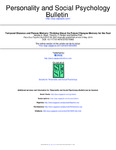Temporal Distance and Person Memory: Thinking About the Future Changes Memory for the Past
| dc.contributor.author | Wyer, Natalie | |
| dc.contributor.author | Hollins, Timothy | |
| dc.contributor.author | Pahl, Sabine | |
| dc.date.accessioned | 2014-04-03T11:55:14Z | |
| dc.date.accessioned | 2014-04-03T11:55:24Z | |
| dc.date.available | 2014-04-03T11:55:14Z | |
| dc.date.available | 2014-04-03T11:55:24Z | |
| dc.date.issued | 2010-06 | |
| dc.identifier.issn | 0146-1672 | |
| dc.identifier.issn | 1552-7433 | |
| dc.identifier.uri | http://hdl.handle.net/10026.1/2943 | |
| dc.description.abstract |
<jats:p> Psychological distance has been shown to influence how people construe an event such that greater distance produces high-level construal (characterized by global or holistic processing) and lesser distance produces low-level construal (characterized by detailed or feature-based processing). The present research tested the hypothesis that construal level has carryover effects on how information about an event is retrieved from memory. Two experiments manipulated temporal distance and found that greater distance (high-level construal) improves face recognition and increases retrieval of the abstract features of an event, whereas lesser distance (low-level construal) impairs face recognition and increases retrieval of the concrete details of an event. The findings have implications for transfer-inappropriate processing accounts of face recognition and event memory, and suggest potential applications in forensic settings. </jats:p> | |
| dc.format.extent | 805-816 | |
| dc.format.medium | Print-Electronic | |
| dc.language | en | |
| dc.language.iso | eng | |
| dc.publisher | SAGE Publications | |
| dc.relation.replaces | http://hdl.handle.net/10026.1/2942 | |
| dc.relation.replaces | 10026.1/2942 | |
| dc.subject | psychological distance | |
| dc.subject | person memory | |
| dc.subject | construal level | |
| dc.title | Temporal Distance and Person Memory: Thinking About the Future Changes Memory for the Past | |
| dc.type | journal-article | |
| dc.type | Journal Article | |
| plymouth.author-url | https://www.webofscience.com/api/gateway?GWVersion=2&SrcApp=PARTNER_APP&SrcAuth=LinksAMR&KeyUT=WOS:000278436100007&DestLinkType=FullRecord&DestApp=ALL_WOS&UsrCustomerID=11bb513d99f797142bcfeffcc58ea008 | |
| plymouth.issue | 6 | |
| plymouth.volume | 36 | |
| plymouth.publication-status | Published | |
| plymouth.journal | Personality and Social Psychology Bulletin | |
| dc.identifier.doi | 10.1177/0146167210370965 | |
| plymouth.organisational-group | /Plymouth | |
| plymouth.organisational-group | /Plymouth/Faculty of Health | |
| plymouth.organisational-group | /Plymouth/REF 2021 Researchers by UoA | |
| plymouth.organisational-group | /Plymouth/REF 2021 Researchers by UoA/UoA04 Psychology, Psychiatry and Neuroscience | |
| plymouth.organisational-group | /Plymouth/REF 2021 Researchers by UoA/UoA04 Psychology, Psychiatry and Neuroscience/UoA04 Psychology, Psychiatry and Neuroscience MANUAL | |
| plymouth.organisational-group | /Plymouth/REF 2021 Researchers by UoA/UoA04 Psychology, Psychiatry and Neuroscience/UoA04 REF peer reviewers | |
| plymouth.organisational-group | /Plymouth/Research Groups | |
| plymouth.organisational-group | /Plymouth/Research Groups/Centre for Brain, Cognition and Behaviour (CBCB) | |
| plymouth.organisational-group | /Plymouth/Research Groups/Centre for Brain, Cognition and Behaviour (CBCB)/Behaviour | |
| plymouth.organisational-group | /Plymouth/Research Groups/Centre for Brain, Cognition and Behaviour (CBCB)/Cognition | |
| plymouth.organisational-group | /Plymouth/Research Groups/Institute of Health and Community | |
| plymouth.organisational-group | /Plymouth/Users by role | |
| plymouth.organisational-group | /Plymouth/Users by role/Researchers in ResearchFish submission | |
| dc.publisher.place | United States | |
| dc.identifier.eissn | 1552-7433 | |
| dc.rights.embargoperiod | Not known | |
| rioxxterms.versionofrecord | 10.1177/0146167210370965 | |
| rioxxterms.licenseref.uri | http://www.rioxx.net/licenses/all-rights-reserved | |
| rioxxterms.type | Journal Article/Review |


